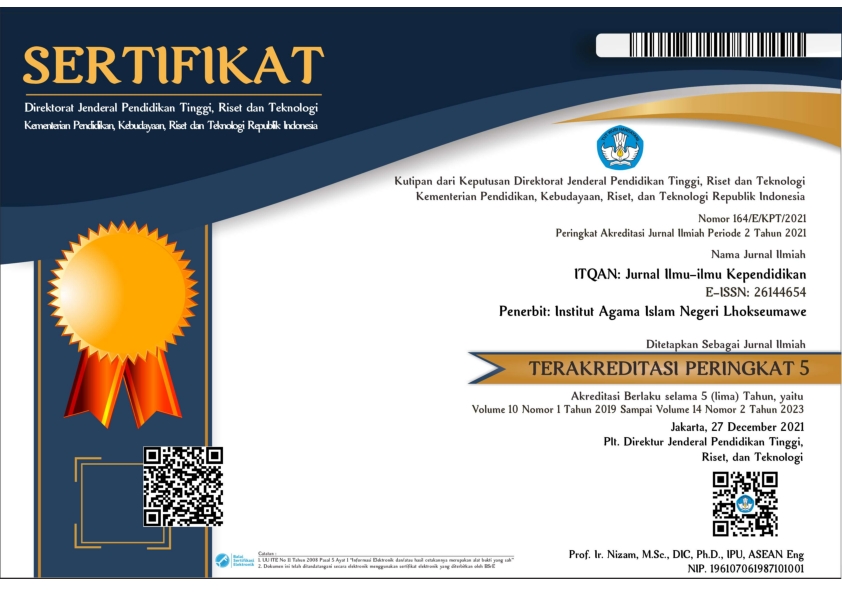Implementation of Project Base-Learning in Improving Critical Thinking Skills in Early Childhood
Main Article Content
Okta Sulistiyo Rina Hatuwe
Sy. Nurul Syobah
Husni Idris
This study investigates the implementation of Project-Based Learning (PBL) as a means to improve critical thinking skills in early childhood. The research was conducted at Nurul Hikmah Integrated Islamic Kindergarten (TKIT) and Handayani III Kindergarten (TK) in Penajam Paser Utara District, with the aim of supporting the implementation of the independent curriculum. This study uses a qualitative research design, using data collection techniques such as interviews, observations, and document studies. while data collection techniques are carried out by condensing data, displaying data, and drawing conclusions. The research findings show that PBL has proven to be an effective approach in improving early childhood critical thinking skills. Through the implementation of carefully planned PBL activities, children showed significant progress in their ability to identify problems, generate creative solutions, and consider different perspectives. In addition, PBL encourages the development of social skills, collaboration and creativity through teamwork and group discussions. Based on the research findings, it is recommended that the implementation of PBL in early childhood education follows a structured process. This includes defining clear learning objectives, selecting interesting and relevant project topics, setting realistic time frames, defining assessment criteria, providing necessary materials and resources, and offering guidance and support throughout the learning process. This research contributes to the existing literature by providing insights into the effective implementation of PBL to enhance critical thinking skills in early childhood education. The findings underscore the importance of well-structured planning, implementation, and evaluation to maximize the benefits of PBL. Further research is encouraged to explore additional factors and strategies that can further improve PBL implementation and outcomes in early childhood education settings. This study also identified several supporting factors that influence the successful implementation of PBL, including: the presence of creative and visionary teachers, a conducive learning environment, relevant learning content and the availability of resources. Conversely, inhibiting factors such as limited support from families, rigid curriculum constraints, limited resources and time constraints were also recognized.
Andersson, C., & Palm, T. (2017). The Impact of Formative Assessment on Student Achievement: A Study of the Effects of Changes to Classroom Practice After a Comprehensive Pofessional Development Programme. Learning and Instruction, 49, 92–102. https://doi.org/10.1016/j.learninstruc.2016.12.006.
Andrade, H., & Du, Y. (2005). Student Perspectives on Rubric-Referenced Assessment. Practical Assessment, Research, and Evaluation, 10(1), 3. https://doi.org/https://doi.org/10.7275/g367-ye94.
ÇAKICI, Y., & Türkmen, N. (2013). An Investigation of the Effect of Project-Based Learning Approach on Children’s Achievement and Attitude in Science. TOJSAT, 3(2), 9–17.
Daniel, F. (2017). Kemampuan Berpikir Kritis Siswa pada Implementasi Project Based Learning (PJBL) Berpendekatan Saintifik. JPMI (Jurnal Pendidikan Matematika Indonesia), 1(1), 7–13.
Dunn, K. E., & Mulvenon, S. W. (2009). A Critical Review of Research on Formative Assessments: The limited Scientific Evidence of the Impact of Formative Assessments in Education. Practical Assessment, Research, and Evaluation, 14(1), 7. https://doi.org/https://doi.org/10.7275/jg4h-rb87.
Eka Retnaningsih, L., & Khairiyah, U. (2022). Kurikulum Merdeka pada Pendidikan Anak Usia Dini. Jurnal Program Studi PGRA, 8(1), 143–158.
Feng, H., & Wang, D. (2019). Teaching Evaluation Based on Project Learning. 2019 9th International Conference on Social Science and Education Research (SSER 2019) Recuperado de Https://Webofproceedings. Org/Proceedings_series/ESSP/SSER, 202019.
Gillies, R. M. (2019). Promoting Academically Productive Student Dialogue During Collaborative Learning. International Journal of Educational Research, 97, 200–209. https://doi.org/10.1016/j.ijer.2017.07.014.
Handrianto, C., & Rahman, M. A. (2019). Project Based Learning: A Review of Literature on its Outcomes and Implementation Issues. LET: Linguistics, Literature and English Teaching Journal, 8(2), 110–129. https://doi.org/http://dx.doi.org/10.18592/let.v8i2.2394.
Koh, K. H. (2017). Authentic Assessment. In Oxford Research Encyclopedia of Education. Oxford University Press. https://doi.org/10.1093/acrefore/9780190264093.013.22.
Lintangsari, A. P., Emaliana, I., & Kusumawardani, I. N. (2022). Improving Learners’ Critical Thinking and Learning Engagement Through Socratic Questioning in Nominal Group Technique. Studies in English Language and Education, 9(2), 705–723. https://doi.org/10.24815/siele.v9i2.22352.
Mariamah, S., Bachtiar, Muhammad, Y., & Indrawati, I. (2021). Penerapan Project Based Learning Untuk Meningkatkan Kemampuan Kolaborasi Anak Usia Dini. Profesi Kependidikan, 2(1), 125–130.
Miles, M. B., Huberman, A. M., & Saldaña, J. (2014). Qualitative Data Analysis: A Methods Sourcebook (3rd ed.). SAGE Publications.
Perayani, K., & Rasna, I. W. (2022). Pembelajaran Keterampilan Menyimak dengan Menggunakan Media Podcast Berbasis Model Pembelajaran Project Based Learning (PjBL). Jurnal Pendidikan dan Pembelajaran Bahasa Indonesia, 11(1), 108–117.
Rifa’i, M., Muadin, A., Faiz, F., Khomsiyah, L., & Mabruroh, A. (2022). Menciptakan Pembelajaran Efektif melalui Penguatan Komitmen Guru PAUD. Jurnal Obsesi : Jurnal Pendidikan Anak Usia Dini, 6(4), 3739–3746. https://doi.org/10.31004/obsesi.v6i4.2122.
Rineksiane, N. P. (2022). Penerapan Metode Pembelajaran Project Based Learning Untuk Membantu Siswa dalam Berpikir Kritis. Jurnal Pendidikan Manajemen Perkantoran, 7(1), 82–91. https://doi.org/10.17509/jpm.v7i1.43124.
Roessingh, H., & Chambers, W. (2011). Project-Based Learning and Pedagogy in Teacher Preparation: Staking Out the Theoretical Mid-Ground. International Journal of Teaching and Learning in Higher Education, 23(1), 60–71.
Salabi, A. S. (2021). Pendidikan Karakter Berbasis Gender: Studi Kasus di Taman Kanak-Kanak Putroe Nahrisyah Lhokseumawe. Saree: Research in Gender Studies, 3(2), 219–228. https://doi.org/https://doi.org/10.47766/saree.v3i2.625.
Sari, A. Y., & Astuti, R. D. (2018). Implementasi Pembelajaran Project Based Learning Untuk Anak Usia Dini. Paud Motoric, 1(1), 1–13. https://doi.org/10.31090/paudmotoric.v1i1.547.
Taufiqurrahman, T., & Junaidi, J. (2021). Pembelajaran Berbasis Proyek (Project-Based Learning) untuk Mengembangkan Keterampilan Abad 21. INCARE, International Journal of Educational Resources, 02(02).
Wylie, E. C., Gullickson, A. R., Cummings, K. E., Egelson, P. E., Noakes, L. A., Norman, K. M., & Veeder, S. A. (2012). Improving formative assessment practice to empower student learning. Corwin Press.
Yunita, H., Meilanie, S. M., & Fahrurrozi, F. (2019). Meningkatkan Kemampuan Berpikir Kritis melalui Pendekatan Saintifik. Jurnal Obsesi : Jurnal Pendidikan Anak Usia Dini, 3(2), 425. https://doi.org/10.31004/obsesi.v3i2.228.




